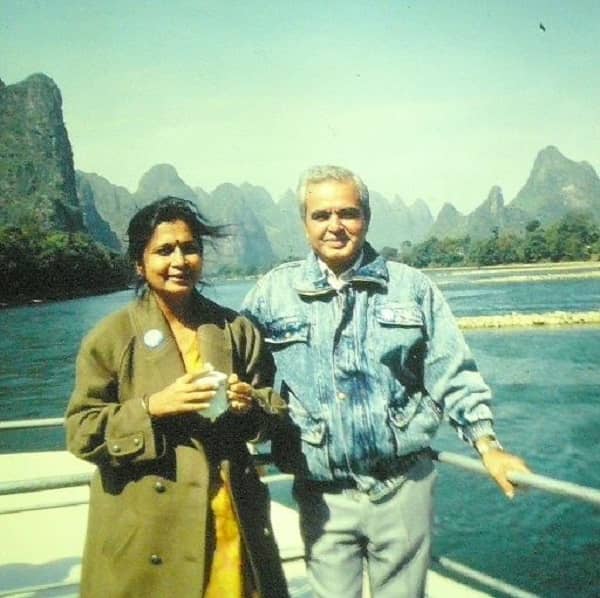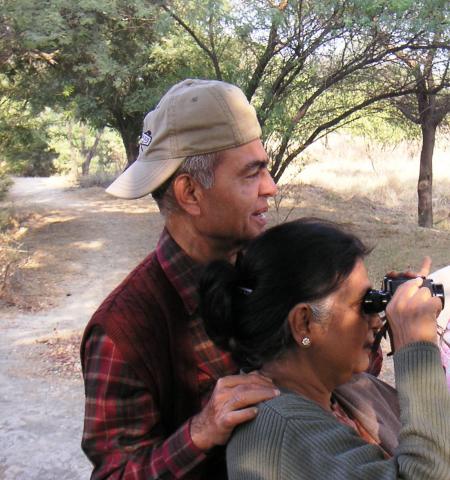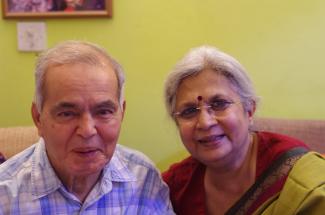
Veena Sheel Bhatnagar, 80, a former lecturer of Economics, has been a non-stop caregiver for over five decades to her family members, the last being her late husband Vijay Sheel Bhatnagar who had Parkinson’s Disease. Here she recounts her long journey caregiver and shares many learnings.
I became a caregiver soon after my marriage in 1963 at age 22. Since then it has it has been a nonstop 50+ year journey of caregiving. Till recently, I was a looking after my husband who had Parkinson’s Disease. He passed away in 2015.
Father-in-law
Four years after my marriage, my father-in-law, who was the Chief Design Engineer of Bhakra Dam, met with a car accident during his official travels. He had a traumatic brain injury (TBI), leaving his left side paralysed and his cognitive abilities badly affected. He was just 54, and my husband was the eldest of six siblings, several of whom were still studying. My husband and I, therefore had to play an active role in taking care of him. Later he returned home from hospital, but with severe mental and physical impairments. I would accompany him for physiotherapy and brain injury rehabilitation where he was taught basics like to how to speak, read, do simple math. With determination and strong conviction, he recovered miraculously and was back on the job within two years, able to walk with leg braces and support, though his left hand and leg remained non-functional. In the following years, he continued to need close watch and care, especially because he was a diabetes patient. Not that we were there all the time, as my husband was in the railways and we were travelling.
Mother-in-law
My mother-in-law had also been severely asthmatic since early life. A few years after my father-in-law’s recovery, the asthma started affecting her seriously. Her asthmatic bouts would be so acute that she had to be often rushed to the hospital in a critical state. As the principal caregiver, I would visit the hospital, and at home would oversee her medicines and diet. There was a particular phase, I remember, which was quite difficult for all of us. She had a brain haemorrhage which damaged her brain permanently. We had to look after her as she lay in bed in a vegetative state for 2 years.
My Parents
My mother and father too needed care. They were dependent on me right from the beginning as both my sisters were settled abroad. One day my mother developed a strange kind of fever. It was of unknown origin and kept recurring. She had to be admitted to the hospital for long durations. But nothing seemed to cure her fever. After a few months she passed away. That journey was extremely painful.
Challenging phase
Those were extremely difficult days for me. I had two young children of my own to raise. I had done my Masters in Economic from Delhi School of Economics and had started my career as lecturer. I had to deftly juggle around my responsibilities to ensure I was fulfilling all of them ably.
Husband
After the long caregiving stretch of my in-laws and parents, I thought I could go easy. But then my husband, Vijay Sheel Bhatnagar, was diagnosed with Parkinson’s Disease (PD) at 61. That was a real shock for me.
It began with mild symptoms. He began having trouble lifting his foot that caused him to drag his leg and his hands were getting stiff. He couldn’t move or swing them freely. Being a mechanical engineer, he was required to travel extensively. Before the onset of PD, he was with the Indian Railway Service, from where he took voluntary retirement to join the World Bank. Then he switched to the corporate sector. It was during his stint here that he began having problems with his movement. But despite hardships, he would attend office and travel alone. He wouldn’t stop travelling even when he was on a wheelchair. I used to travel along with him and take him everywhere. In many ways, he was like his father: a man of great resolve and courage. It was admirable to see him not being cowed down by his illness. Finally, at the age of 68, when his Parkinson’s had advanced considerably, he stopped working.
After he quit his job, he wanted to keep himself equally busy at home. He would immerse himself in some project or the other. I remember, at one time, he became deeply involved in arranging and cataloguing pictures he had taken over the years. He was a passionate photographer and had collected thousands of pictures. So he would call a computer person to help him in arrange them.
Progression of PD
However, as the disease progressed, I could see his movements were becoming more laborious. Even simple acts like opening/closing drawers, or pressing the button on the TV remote required tremendous effort. He would insist on going for a walk in the park, till he was having to be almost fully supported to walk.
When he was around 71 years, he was advised to get the deep brain stimulation (DBS) surgery done, which involved electrodes being implanted into the brain to treat advanced Parkinson’s symptoms. It was a difficult decision as we weren’t familiar with the procedure. However, my husband finally decided to go ahead with it. He was a fighter, so he wanted to exercise whatever options were available for him to overcome the disease. While the surgery dramatically improved several symptoms, the post operative care was very complex and took several months to stabilise. The intervention did however give him several more years of functionality, which would otherwise have been impaired if he had depended only on oral medication.
Death
During the later stages, he couldn’t write or speak properly. Conversing with him became a huge problem. Our communication had come to a total halt. He just lay in bed and allowed himself to be cared. After being taken to the hospital several times, he refused to leave home. So I created a comfortable stay at home with all the facilities. I was giving him oxygen and all his medicines. We had two attendants looking after him.
Just a few days before he passed away he was declining in his awareness. I gauged that he was heading towards a coma situation. He had always been such a vibrant person, I didn’t want him to go into coma. That night I held his hand and chanted fervently. I told him ‘Go if you want to’. The end came with his oxygen level dropping. In 3 minutes after that he was gone. That’s how he left, and I was happy that he breathed his last peacefully at home.
He passed away on 18 June, 2015.
Spiritual Support
My journey of caregiving started when I was in my early twenties. I think somewhere along the way, amidst the continuous cycles of illnesses and sickness of my loved ones, I embraced Buddhism for solace and strength. I have been a Buddhist by practice for 30 years now. It not only helped me remain calm, but it also helped me fight my circumstances. I feel it is important for a caregiver to grow spiritually as well. Also, in philosophical terms, it is comforting to accept that after death, the journey continues. It not the end, it is only loss of the body; the soul remains.
Learning as Caregiver
It is important to understand the psychology of a patient with PD. The patient gets frustrated at not being able to do things on his own and the growing dependence. He tends to lose his temper a lot. And on most occasions the annoyance and fury is directed at the caregiver. So I was the recipient of many outbursts. That was the oppressive phase of caregiving when demands were put on me. But you have to understand that where it is coming from. They say the nature changes of the person with Parkinson’s. They may be the same physically, but mentally and emotionally, they are not the same.
Whatever the condition, it is important to support the patient not only physically, but also emotionally and psychologically. If the patient is well looked after, then the caregiver is also at peace. It is also crucial to understand the disease and its various stages. The caregiver becomes more tolerant and empathetic, if he or she is knowledgeable about the disease. Because you cannot help the decline, you accept it gracefully and with dignity.
Most difficult stage of caregiving
The caregiving responsibilities increase with increasing disability and symptoms of PD, particularly with mental health problems of depression, hallucinations or confusion. This phase was the most difficult. I had handled sicknesses, so I knew how to look after them, but this was different and disturbing. It became extremely tough to control the impulses, temper and growing hallucinations towards the latter part of the disease.
I learnt from the doctor that hallucinations occur even during the day. Those episodes were very personal and they hurt. At that time one couldn’t talk to anybody else, except the doctor. The doctor was like a confidante to me. Sometimes I would react in frustration but the doctor would make me realise that it is not my husband but the disease that is manifesting itself.
We had always been an affectionate couple, supporting each other at every juncture. People would comment that we were an ideal pair. It was our bond that enabled us to navigate the immense challenges of the disease with fortitude and to the best of our abilities.
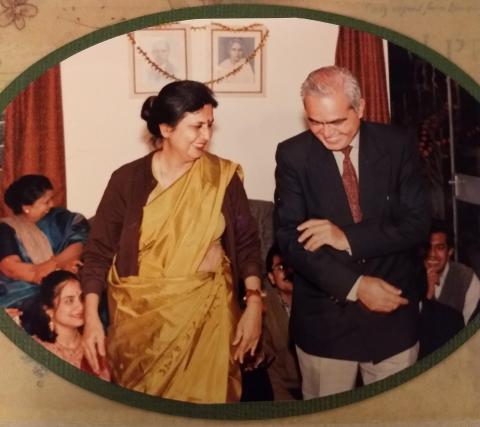
Now - at 80
Thankfully, I am pretty healthy person at 80. I keep myself busy. I am involved in social and community work. Since teaching has always been my passion, I help underprivileged children. I have also been associated with a charitable organization Talk2Mefoundation concerned with children and education.
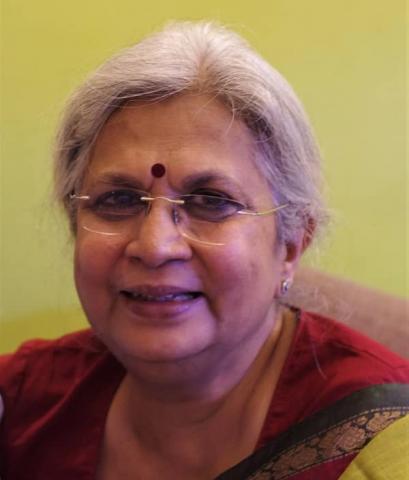
I think, it is the blessings of these people I took care of, that keeps me fit and able-bodied. I am probably inherently born for caregiving. I strongly believe in karmas and it is my karmas that are protecting me now. I am being philosophical because these introspections are required. I feel it gives strength to people. It helps you to face situations and become a better caregiver.

